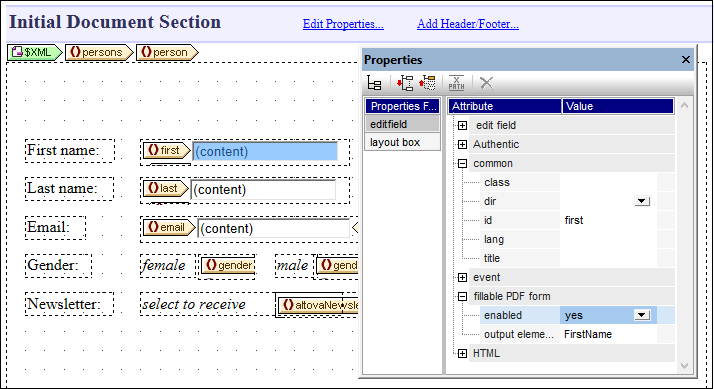Input Fields
If input fields or multiline input fields are enabled for fillable PDF forms, the user can enter data into the input fields of a PDF, and subsequently edit this data. The PDF document can then be saved, and the data in the PDF form can be submitted and/or extracted.
To create an editable input field in a PDF form, carry out the following steps. (Multiline input fields are added in the same way as input fields).
1.Select the Insert Input Field (or Insert Multiline Input Field) toolbar icon. Alternatively, select the menu command Insert Form Controls | Input Field (or Insert Form Controls | Insert Multiline Input Field).
2.In the form's layout container, click the location where you wish to insert the input field (or multiline input field).
3.You will be prompted to select the schema node with which the field is to be associated. This is the node in which user-entered data will be stored. Select the node and click OK. The node and input field will be created inside a layout box. In the screenshot below, input fields have been created for the first, last, and email elements. (The end tag is not displayed if the width of the layout box is not large enough to contain it.)

4.Select the input field in the design, and then set the enabled property of its Fillable PDF Form group of properties to yes (see screenshot above). Alternatively, you can set the property value to an XPath expression that evaluates to the string yes. This is useful, for example, if you wish to specify via a global user-declared parameter that a control is fillable. In this case, first define a global user-declared parameter with a value of yes, then set the enabled property to an XPath expression that calls the parameter, for example: \$MyFillablePDFParam. Since the parameter's value is yes, the control's fillable property will then be enabled.
5.The values of the output element and id properties provide the name of the data field when the form data is saved or extracted. If you do not set at least one of these properties, then data field names are generated automatically, and cannot be known beforehand. If you wish to process field data, it is easier to use the data field name that you set here than a generated name. See the section Form Data, especially Extracting as FDF/XML, for more information.
Note the following points:
•Default values of data fields are taken from the corresponding nodes in the Working XML File. If no Working XML File has been assigned, then there are no default values.
•In the displayed PDF form, the default values are shown in the input field when the PDF form is opened.